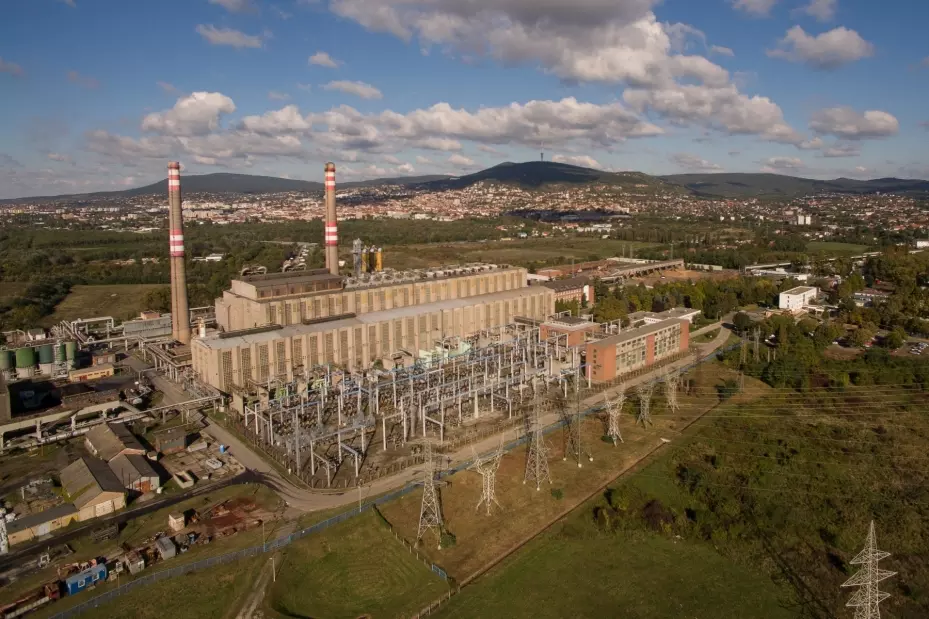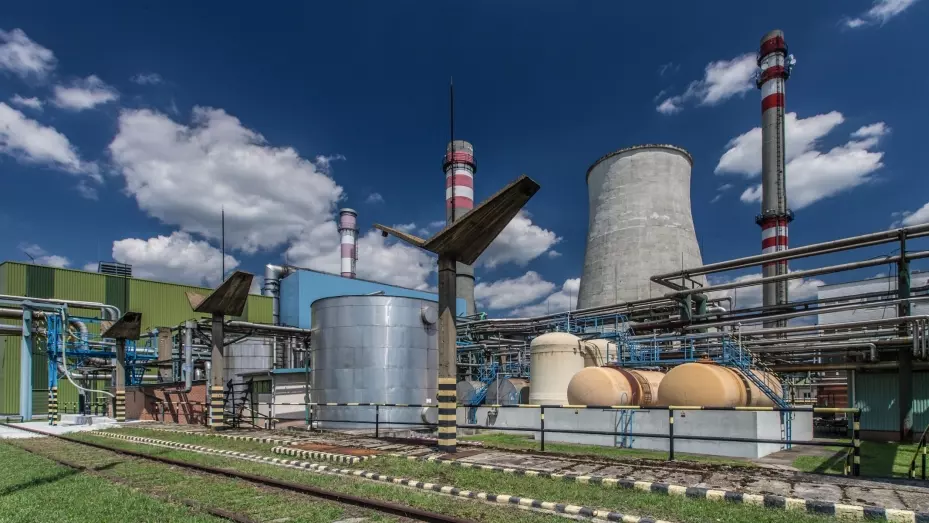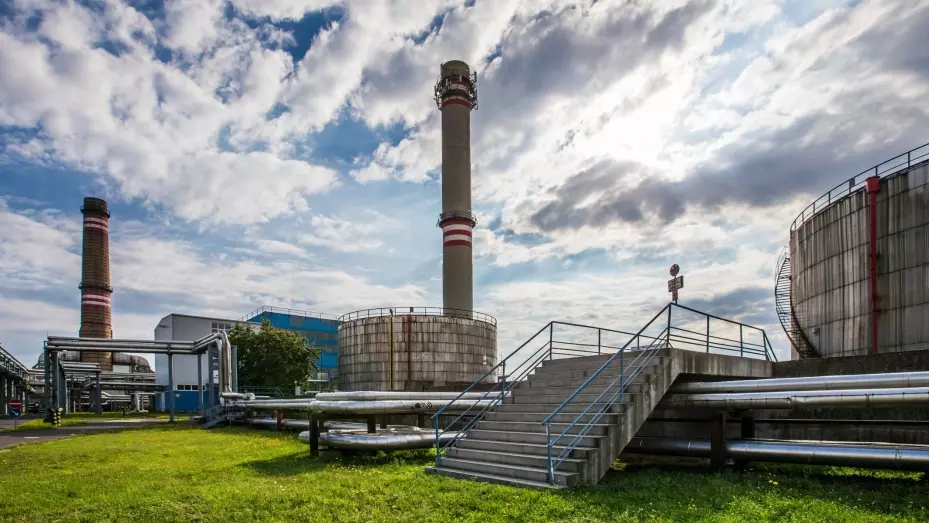Ajka Power Plant
On 28 December 2017, Veolia Energy Hungary acquired the majority shareholding of Bakonyi Erőmű Zrt. (Bakony Power Plant) for long-term professional investment purposes. The power plant, producing heat and electricity, and even industrial steam, fits well into the Veolia power plant portfolio.
Currently the plant generates biomass - wood chips and agricultural by – products to a larger extent, and to a lesser extent, it uses coal to produce steam for the alumina plant and the district heating network in Ajka, and also generates 320,000 MW electricity annually. The 131.6 MW electric and 360 MW built-in heating capacity power plant provides work for a total of 285 people, becoming the largest employer of Ajka.
In the next period our specialists will create different models to determine the necessary investments, will also arrange the environmental indicators of the power plant, so that we are able to say that it is worth replacing the individual heating solutions, the smoking chimneys with a clean, eco-friendly district heating.
Pécs Power Plant

Veolia Energy Hungary purchased 99.94 percent of Pannonpower's shares in 2007. With the transaction, Veolia acquired control over all the businesses of Pannonpower (such as Pannon Hőerőmű Zrt., PANNONGREEN Kft., Pannon-Hő Kft. and Pannon-Biomassza Kft.).
Pannon Hőerőmű operates and maintains the units of the Pécs Power Plant. As a result of the fuel change between 2004 and 2013, two biomass-fired plants are operating currently: a 49.9 MW electric capacity wood chip burning boiler and a boiler of 35 MW electric capacity, which is heated by baled herbaceous agricultural by-products. In addition, since 2013, Pannon Hőerőmű has provided the operational status of the reserve gas boilers. With its operation, Pannon Hőerőmű supplies approximately 31.5 thousand flats and 460 other consumers (e.g.: hospitals, schools, shopping centres, etc.) with district heating.
A Pannon-Biomassza Energetikai és Általános Kereskedelmi Kft. was founded in 2001 to carry out the commercial and logistic support of the Pannonpower Group. Its main task is to purchase the biomass fuel of the Group, to purchase and store the material and parts necessary for the operation, and also the sale of bio-ash.
PANNONGREEN Ltd. operates the largest biomass-firing power station in Central Europe. The built-in fluidized-bed boiler of 49.9 MW capacity is heated by wood chips, timber industrial and agricultural by-products, thus contributing to sustainable energy management and making the city of Pécs more liveable. PANNONGREEN Kft. sells 325-330 GWh of electricity and 350-400 TJ of heat energy annually.
Pannon-Hő Kft. was founded by the Group in 2005 with the aim of implementing and operating the 35 MW electric capacity power station utilizing baled herbaceous agricultural by-products, that are renewable energy sources. Nowadays, the company is responsible for the combined production of electricity and heat with a second biomass boiler in operation since 2013. Pannon-Hő Kft. produces 35-40% of the total electricity volume of the Pécs power plant and approx. 60% of the total district heat demand of the city. The company sells 190-200 GWh electricity and 900-1000 TJ heat energy annually.
Kőbánya (Budapest)
The more than HUF 3 billion investment power plant's activities include 6 industrial consumers’ main steam supply (of which Richter Gedeon Plc. is the largest) and heat-generated electricity sales.
The 62.5 MW heat- and 10 MW electric power plant generates about 189,000 MWh of heat and 111,000 MWh of electricity per year. In addition to the heating equipment, a low and high voltage electrical system, mechanical and other servicing equipment, as well as a natural gas booster station were installed in the new plant.
Due to the modern technologies applied, the new facility fulfils the strict environmental standards to a great extent: this cogeneration unit emits less than 31,500 tons of CO2 per year, as if heat- and electricity generating units of the same capacity were installed separately.
2016 was the year of a model change in the operation of Kőbányahő Ltd. In recent years, due to the unfavourable changes in the electricity market conditions, the 3 gas turbines and the connected heat recovery boilers were swapped by a new steam boiler installation, improving energy efficiency and financial profitability.
With the installation of the new steam boiler, the combined heat and power generation model was replaced by a purely heat generation model. With the change of this business model, our goal is to maintain efficient operation, so that we can ensure our current 6 industrial consumers' (Richter Gedeon Plc., Ceva-Phylaxia Zrt., Xellia Ltd., BKV Zrt., MÁV FKG Gépjavító Kft., Ferencvárosi Torna Club) competitive and safe heat supply and last but not least the long-term profitability of KŐBÁNYAHŐ Ltd.
Nyíregyháza Power Plant

Veolia Energy Hungary took over the power plant block of Nyíregyháza serving as the basis of the local district heating production. The Nyíregyháza power plant produces thermal energy to 15,647 residentials and more than 1,000 other customers. The total thermal energy output is 330, while the electricity output is 58 megawatts.
In Nyíregyháza, along the residential consumers served with district heating, we also need to highlight a significant industrial customer group. Veolia supplies food and automotive companies with steam energy in long term contracts.
With the takeover of the power plant, the company's goal was to provide locals with cheap and environmentally friendly thermal energy, operating and upgrading a system that provides a sustainable energy model in the long term.
Debrecen Power Plant

In 2015, Veolia Energy Hungary took over the power plant block responsible for local district heating production in Debrecen.
The Debrecen Power Plant produces district heating for 31,529 residential and 2,200 other consumers in the second largest city of the country. District heating reaches consumers through a system of 88 kilometres long. The thermal energy output of the equipment purchased is 430, and its electricity output is 102 megawatts.
With the takeover, the goal of the company was to provide locals with cheap and environmentally friendly thermal energy, operating and upgrading a system that provides a sustainable energy model for the settlement in the long run.
Szakoly Power Plant

In 2016, Veolia Energy Hungary acquired the biomass power plant in Szakoly. The foundation stone of the power plant was laid in 2006 and its operation started three years later. The power plant is Hungary's first biomass-fired power plant with a greenfield investment.
The 19.8 megawatt power plant providing jobs for 55 people generates electricity by burning purely biomass - wood chips and sawmill by-products. About 140-150 thousand tons of wood chips are fired at the power plant each year, producing 130 GWh of electricity annually fed into the national electricity grid (enough for 50,000 homes). The power plant currently represents the highest available technology.
The facility also supports Hungary's energy goals in the long run by leaning on the economic and technical background of the Veolia Group. The share of renewable energy sources in the domestic gross energy production reaches 14.65 percent by 2020 totally in line with the EU commitments.

